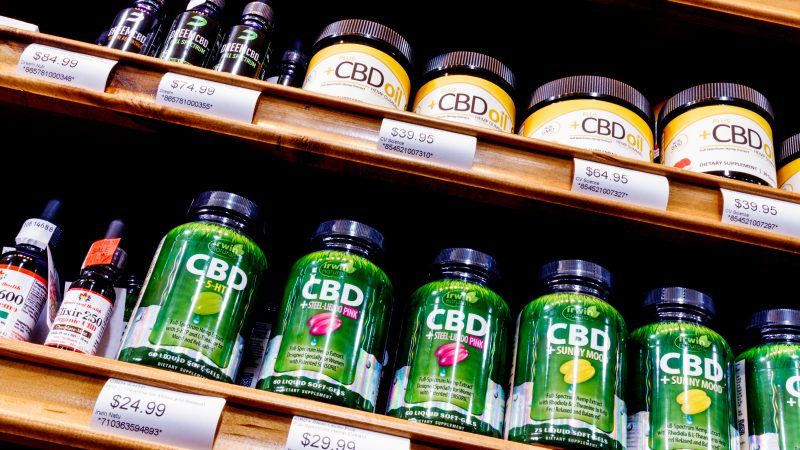FDA Has 'Critical Questions' About Safety of CBD Products
The sale of cannabidiol-infused food and drink is still against the law, even as entrepreneurs flout those restrictions across the country.

Cannabis-derived food and drink selections—from CBD-infused beer to cheeseburgers with "special sauce"—are increasingly en vogue at restaurants and cafés across the country. But they're against the law.
Although CBD—or cannabidiol—is extracted from cannabis plants, it contains little to no THC, so you don't get high from it. The U.S. Food and Drug Administration (FDA), which currently prohibits the use of nutritional items imbued with the compound, held its first hearing Friday on how it will be regulated.
Acting Commissioner Ned Staples opened the meeting with concerns that "critical questions remain about the safety" of CBD products, which extend beyond edibles. Various CBD lotions, oils, and cosmetics have gained popular appeal, with claims that they can alleviate joint pain, anxiety, depression, and a slew of other ills.
But legislation around the products remains thorny, even after the 2018 Farm Bill removed hemp from the controlled substances list, effectively legalizing CBD nationwide. The FDA still regulates various aspects of certain hemp products—hence their moratorium on CBD-infused food, which is rarely enforced but still on the books. States also have some murky rules: In Florida, for instance, a 69-year-old woman was arrested outside Disney World's Magic Kingdom for having CBD oil in her purse. She uses it for her arthritis.
"When hemp was removed as a controlled substance, this lack of research, and therefore evidence, to support CBD's broader use in FDA-regulated products, including in foods and dietary supplements, has resulted in unique complexities for its regulation, including many unanswered questions related to its safety," said Staples.
So is CBD a miracle panacea, a placebo, or something to avoid entirely? The jury's still out, though the World Health Organization reports that it doesn't pose health risks and isn't addictive. Some people in the industry think CBD is here to stay with or without FDA approval, as vendors peddle cannabidiol-infused supplements, gummies, and beverages with growing regularity. They often flout federal regulations and local laws to do so.
In that vein, Paul Armentano, the Deputy Director of the National Organization for the Reform of Marijuana Laws (NORML), testified at Friday's hearing that he "is aware of numerous instances where local law enforcement has seized CBD products from shelves, only to refuse to file criminal charges later. In other instances, regulators have called for removing certain CBD products from retailers because of ongoing questions regarding their legal status.
"In some cases," he continued, "consumers have been arrested for possessing these products, despite the good faith belief that they were legal."
Editor's Note: As of February 29, 2024, commenting privileges on reason.com posts are limited to Reason Plus subscribers. Past commenters are grandfathered in for a temporary period. Subscribe here to preserve your ability to comment. Your Reason Plus subscription also gives you an ad-free version of reason.com, along with full access to the digital edition and archives of Reason magazine. We request that comments be civil and on-topic. We do not moderate or assume any responsibility for comments, which are owned by the readers who post them. Comments do not represent the views of reason.com or Reason Foundation. We reserve the right to delete any comment and ban commenters for any reason at any time. Comments may only be edited within 5 minutes of posting. Report abuses.
Please to post comments


Although CBD—or cannabidiol—is extracted from cannabis plants, it contains little to no THC, so you don't get high from it.
It should be banned because you don't get high from it.
SUGGEST F.D.A. REFORM.
Big Foods 'for greedy profit' has killed more people with processed and counterfeit food items than both world wars and all worldwide terrorist attacks combined. Just Google 'the Swiss milk study' or the 'Harvard milk study', you will find that drinking more than three cups of PASTEURIZED milk has the mortality rate comparable to smoking three packs of cigarettes a day and with a hip-replacement thrown in.Even a cow would not drink that swill. All pastured foods and juices have been sterilized to prolong shelf life. This denatures the protein and destroys nearly all nutrition. You do not even want to know (but you should) what those nuggets are really made from.They no longer qualify as food. Everyone except an uneducated, retarded and ignorant person knows what fried foods do. Drive-throughs are responsible for more deaths than drive by's. If a terrorist wishes to maim kill and hurt Americans all they need do is open a fast food restaurant. The F.D.A. may have started out as an competent research establishment but is now an obsolete deep state throwback to the cold-war era and should redirect their priorities away from politics and promoting the marijuana war and before they allow big foods to kill everyone off.
+1,000,000
Fuck off FDA.
My body, my choice.
I think you have confused a single issue chant with a general reality.
(and of course, the choice is about a body other than your own. Distinct DNA and all that jazz. Child sacrifice by another name)
For males and un-pregnant females, "your body, the government's choice" is more realistic.
I'm not confused. I own my body, not goober mint.
For crissakes, it's a stinking plant!! ENOUGH ALREADY!!!
Thanks admin for giving such valuable information through your article . Your article is much more similar to https://www.mcmbackpackonsale.com/mcm-medium-millie-diamond-visetos-flap-crossbody-in-white.html word unscramble tool because it also provides a lot of knowledge of vocabulary new words with its meanings.